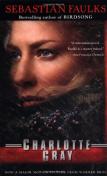BKMT READING GUIDES
Charlotte Gray
by Sebastian Faulks
Paperback : 416 pages
2 clubs reading this now
0 members have read this book
Charlotte Gray tells the remarkable story of a young Scottish woman who becomes caught up in the effort to liberate Occupied France from the Nazis while pursuing a perilous mission of her own.
In blacked-out, wartime London, ...
Introduction
New York Times bestseller by award-winning author of Birdsong
Charlotte Gray tells the remarkable story of a young Scottish woman who becomes caught up in the effort to liberate Occupied France from the Nazis while pursuing a perilous mission of her own.
In blacked-out, wartime London, Charlotte Gray develops a dangerous passion for a battle-weary RAF pilot, and when he fails to return from a daring flight into France she is determined to find him. In the service of the Resistance, she travels to the village of Lavaurette, dyeing her hair and changing her name to conceal her identity. Here she will come face-to-face with the harrowing truth of what took place during Europe's darkest years, and will confront a terrifying secret that threatens to cast its shadow over the remainder of her days. Vividly rendered, tremendously moving, and with a narrative sweep and power reminiscent of his novel Birdsong, Charlotte Gray confirms Sebastian Faulks as one of the finest novelists working today.
Editorial Review
In his 1996 novel, Birdsong, Sebastian Faulks showed himself to be a superb anatomist of men--and, just as importantly, women--at war. Indeed, his depiction of trench combat during World War I was almost painfully vivid: the equivalent of Wilfred Owen in prose, minus the lingering idealism. Now the author shifts his focus to the next global conflict in Charlotte Gray. This time the year is 1942, when "England was blacked out and afraid." The 25-year-old heroine has just traveled down from Edinburgh to London, hoping to make some contribution to the war effort. In short order she falls in love with a British pilot, mourns his disappearance and apparent death in France, and follows him across the Channel to assist the nascent French Resistance.On the face of it, these are the ingredients of a historical potboiler. But Faulks is such a gifted storyteller that we seldom notice the threadbare nature of the raw material. Instead, all but the most churlish reader will be drawn into Charlotte's tribulations, which are not merely geopolitical but amorous: "The last thing she needed was some uncontrolled romance. She wanted to be helpful, she wanted to lead a serious life, not to lie sobbing in her bed for a disembodied yearning. Still less did she wish to see it embodied, with the complication and the fear that all that would entail." (Note: Charlotte is that rare thing, a virginal heroine, at least until page 61.) What's more, the author's evocation of Occupied France is a triumph of grimy, monochromatic realism. Here the small triumphs of Charlotte and her circle are expertly offset by the larger tragedies of what we've come to call, with only middling accuracy, the Good War. --William Davies
Discussion Questions
No discussion questions at this time.Book Club Recommendations
Recommended to book clubs by 0 of 0 members.
Book Club HQ to over 88,000+ book clubs and ready to welcome yours.
Get free weekly updates on top club picks, book giveaways, author events and more








